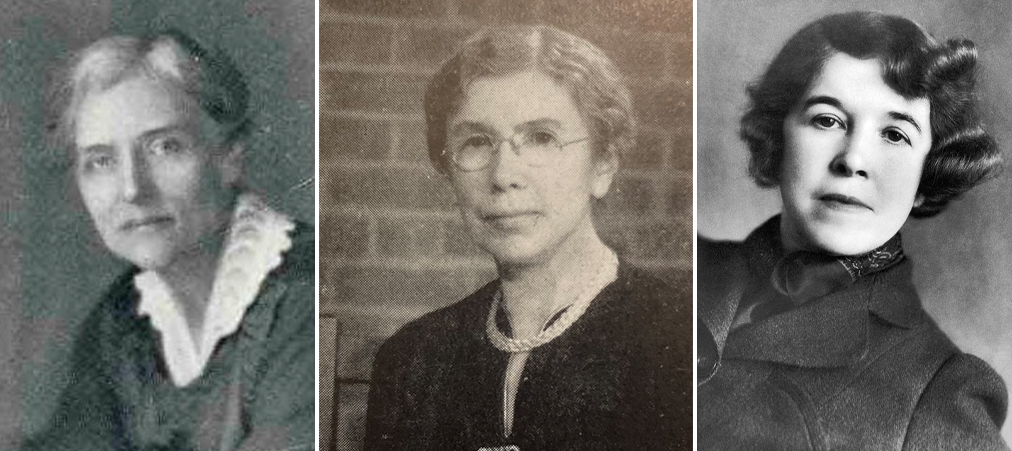History
At Vassar, the practice of theatre began in the English Department and may be traced back to three influential female faculty members (Gertrude Buck, Winifred Smith (’04), and Hallie Flanagan) along with the support of the college President Henry Noble MacCracken.
Video: History of the Drama Department
Video created by Parker Fairfield ’24 and Ben Morgan ’25, narrated by Ben Morgan ’25.
At the beginning of the twentieth century, liberal arts institutions did not perceive the practice of staging plays as a viable, worthwhile course of study; it was, instead, considered an extracurricular activity. However, dramatic literature was included in the curriculum of many departments of English. At Vassar in roughly 1916, Winifred Smith taught Shakespeare, Gertrude Buck taught playwriting, and President MacCracken was teaching a class on the development of English Drama. Professor Smith, who graduated from Vassar in 1904, also conducted research on the practice of commedia dell’arte during the sixteenth century in Italy. In fact, her book, Commedia Dell’arte: A Study in Italian Popular Comedy (Columbia University Press, 1912), was a standard text on the subject for more than half a century. She believed students should not only read plays but engage in theatrical production because the plays they were reading were meant to be seen on stage. Similarly, Professor Buck strongly believed that her students needed to see the plays they were writing being performed so they might understand their effect on an audience. She began a dramatic workshop for students in her English 111-112 playwriting class so they could test their work. By 1920, the English department offered a class titled Dramatic Production and one of the first plays from that course was Edna St. Vincent Millay’s (’17) one-act play Aria da Capo. Regrettably, Professor Buck died in 1922; however, she set the foundation for the Department of Drama with her Dramatic Production course.

By 1921, the English department had expanded its speech division, created in 1917 because the college required students to have two years of vocal expression. The expansion included the Dramatic Production course begun by Gertrude Buck and courses titled The Technique of Dramatic Expression, and Dramatic Presentation. In 1924, Hallie Flanagan was hired to direct the division of speech within the English department and was further directed by President MacCracken to restructure the program. Her attempt to expand the offerings to a full four-year curriculum including acting, directing, design, and stage history was met with opposition by many members of the English department; fortunately, she found an ally in Winifred Smith. Professors Flanagan and Smith attempted to create an independent major in drama; unfortunately, the dean of the college, Mildred Thompson saw no value in the study of theatre outside of the study of dramatic literature and playwriting and opposed their plans. Hallie Flanagan spent the 1926/27 academic year away from Vassar on a Guggenheim fellowship in Europe meeting with renowned playwrights, directors, and designers of the early twentieth century. She returned to Vassar and, with the support of President MacCracken who often acted in Flanagan’s work, founded the Experimental Theatre in 1930 and staged significant productions at the college. In 1935, with the support of the English department, she again proposed a new, separate department with a concentration in drama, but her plan was rejected by the college curriculum committee. At that, Hallie Flanagan took a leave of absence from Vassar to become the director of the Federal Theatre Project during the administration of Franklin Roosevelt.
Winifred Smith continued to propose a separate concentration in drama, and in 1939 the college finally approved the new major and appointed Professor Smith chair of the Department of Drama. Hallie Flanagan returned briefly to Vassar after the Federal Theatre Project disbanded but accepted a position at Smith College in 1942. That same year, Mary Virginia Heinlein (’25) was hired to direct the Experimental Theatre in the department and she would eventually become chair after Winifred Smith retired in 1947. The theatre department owes its existence to these three pioneering women, (Buck, Smith, and Flanagan), who believed that theatre production, the practical skills of making theatre, was a significant course of study and that dramatic literature and playwriting should not be separated from learning the practice of staging plays. As the Department of Theatre has grown with the addition of faculty and facilities, such as the Powerhouse Theatre and the Vogelstein Center for Drama and Film, it continues to emphasize the importance of learning practical skills in making theatre in combination with the study of dramatic literature, theory, and playwriting.
Compiled primarily from Sprinchorn, Evert. “Stagestruck in Academe: Acceptance of theatre as a liberal art was no overnight success.” Vassar Quarterly 87, no. 2 (Spring 1991): 18-26.